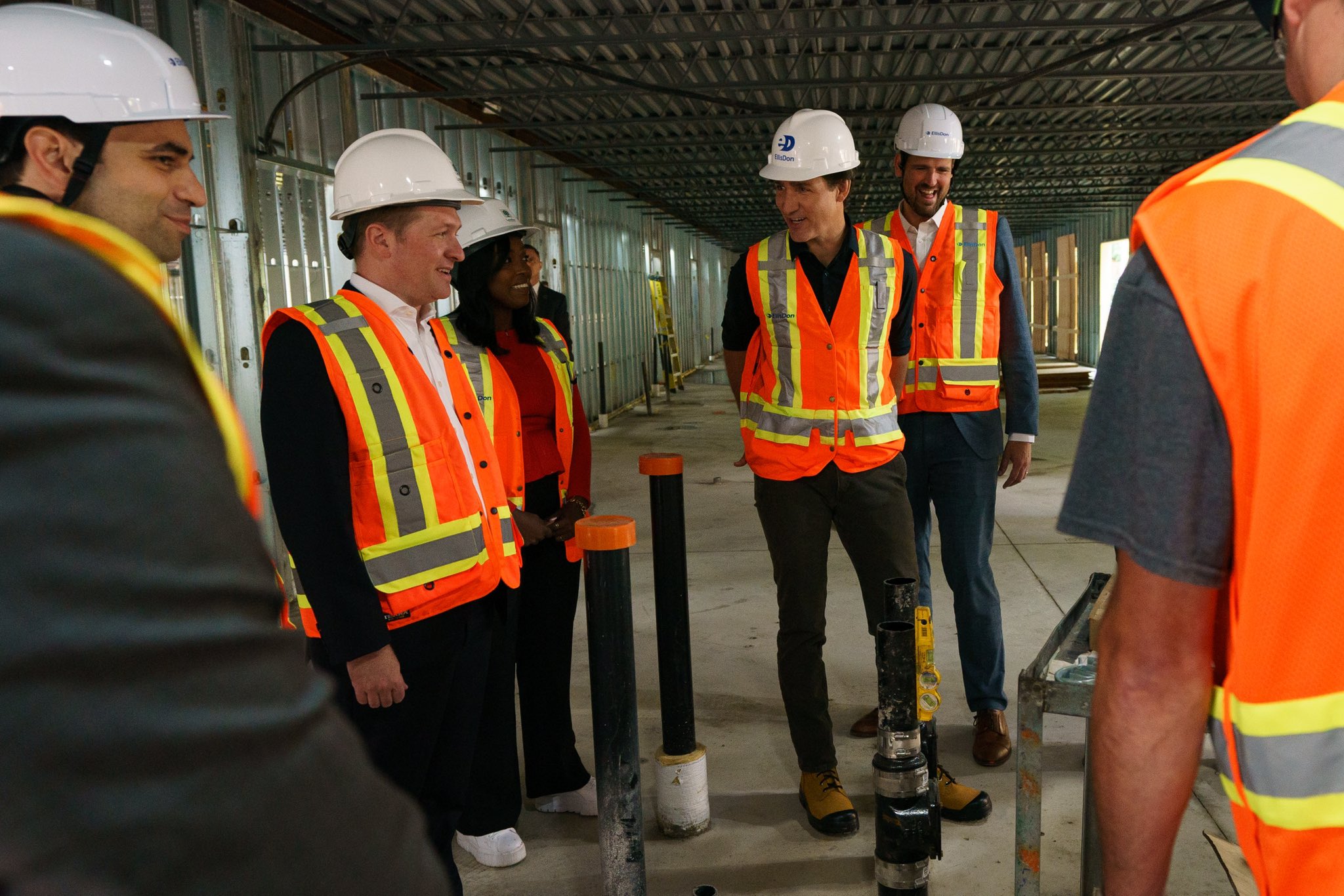Trudeau: No more federal GST for apartment rental projects
The prime minister urged each province to do the same.

Prime Minister Justin Trudeau tours a housing project in London, Ont. – Government of Canada
Key Takeaways:
- Qualifying projects must be new buildings with at least four private apartment units, or at least 10 private rooms or suites, and 90% of residential units designated for long-term rental.
- The enhanced GST Rental Rebate will not apply to individually-owned condominium units, single-unit housing, duplexes, triplexes, housing co-ops, and owned houses situated on leased land and sites in residential trailer parks.
- For a two-bedroom rental unit valued at $500,000, the enhanced GST Rental Rebate would deliver $25,000 in tax relief.
- To protect Canadian renters from renovictions, the enhanced GST Rental Rebate will not apply to substantial renovations of existing residential complexes.
The Whole Story:
Federal GST will be dropped for new rental apartment projects.
The news came from Prime Minister Justin Trudeau and Deputy Prime Minister and Finance Minister Chrystia Freeland after a Liberal caucus retreat in Ontario.
“The most expensive cost for people these days is housing. And the best way to tackle this is to make sure that more homes of all types are being built,” said Trudeau. “More and more Canadians are renting and the cost of rent keeps going up. Canadians need more buildings for renters, not just condos to turn into Airbnbs or sold to foreign buyers as financial assets.”
The enhancement increases the GST Rental Rebate from 36% to 100% and removes the existing GST Rental Rebate phase-out thresholds for purpose-built rental housing projects. Trudeau encouraged provinces to do the same.
The move comes after Trudeau and the Liberals have been facing intense pressure from voters. A new Abacus Data survey found that Millennials are now twice as likely to vote Conservative instead of Liberal. The rising cost of living was cited as the number one issue for Canadians under 40, a key demographic for Trudeau. The latest Angus Reid Institute shows that Trudeau now has an approval rating of just 33 per cent, against a disapproval rating of 63 per cent.
Other efforts to spur housing construction
It isn’t the only move Trudeau has made to address affordability. Earlier this week he traveled to London, Ont. to announce that the city would be the first in Canada to strike a deal with the government’s Housing Accelerator Fund. The fund allocates $4 billion until 2026-27 to encourage more homebuilding in cities.
As per the deal, London will receive $74 million if it implements a series of reforms, including a change to local zoning rules that should make it easier to build more rental units.
Officials say the agreement will produce 2,000 housing units over the next three years and will help build thousands more beyond that.
“Every community across Canada needs to build homes faster so we can lower the cost of housing,” said Trudeau.
The announcement was quickly praised by by the Residential Construction Council of Ontario (RESCON) which noted that the Ontario government has indicated that it plans to follow suit with the HST.
“We haven’t built enough purpose-built rentals to accommodate our growing population, yet projects were still being saddled with whopping sales taxes on the fair market value of a building upon completion,” said RESCON president Richard Lyall. “When encumbered with such formidable financial hurdles, developers often find it difficult to proceed with apartment building projects. These adjustments are clearly a step in the right direction as it will shave costs from constructing apartments and lead to more building.”
RESCON is also advocating for tax incentive programs that eliminate the collection of taxes on profits emanating from residential construction projects where the funds are re-invested into advancing similar projects. They noted that programs like this resulted in tens of thousands of housing units in the 1960s and 1970s.
What qualifies for the rebate
Qualifying projects must be new buildings with at least four private apartment units, or at least 10 private rooms or suites, and 90% of residential units designated for long-term rental.
Projects that convert existing non-residential real estate, such as an office building, into a residential complex would be eligible for the enhanced GST Rental Rebate if all other above conditions are met. Public service bodies would also be eligible to access the enhanced GST Rental Rebate.
The enhanced GST Rental Rebate will not apply to individually-owned condominium units, single-unit housing, duplexes, triplexes, housing co-ops, and owned houses situated on leased land and sites in residential trailer parks, but this housing would continue to qualify for the existing GST Rental Rebate where the conditions for the existing rebate are met.
To protect Canadian renters from renovictions, the enhanced GST Rental Rebate will not apply to substantial renovations of existing residential complexes.
Editor’s Note: This story has been updated as of Sept. 14, 4:30 p.m. with new information.

